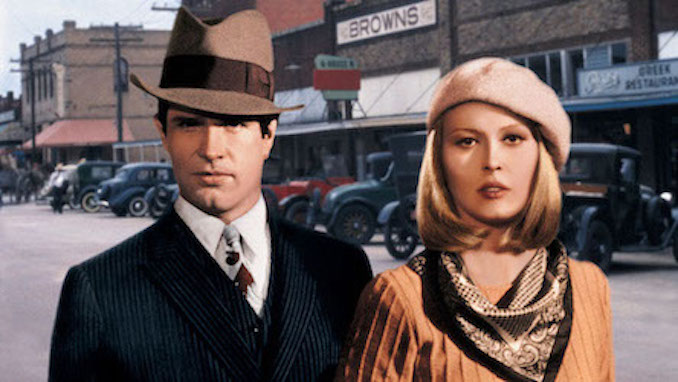 This is what happens when your head is so far up your ass all you can see is your navel…
This is what happens when your head is so far up your ass all you can see is your navel…
Let’s start from the beginning. The Oscars are irrelevant to everybody but those in the fading film industry itself – other than those who come out once a year to complain about this or that.
There, I said it.
How did this happen?
Well, films devolved from art to business.
Oh, they were always a business, but along the way studios and directors occasionally created art and therefore gained respectability. But TV threw a monkey wrench in the whole process so the industry went for event pictures.
Then it the 1960s found that by tackling stories too outré, too sexy, too deep, too dangerous for TV, people would be drawn to the theatre.
Sure, there was still lowbrow stuff purveyed, but it was films like “Bonnie & Clyde” and “The Graduate” and “The Godfather,” never mind classic comedies like “Annie Hall,” that drove people to the theatre, but even more, had America and the world, talking about them.
Those days are through.
Let me catalog the reasons…
Pure greed. Once “Jaws” and then “Star Wars” demonstrated how much money could be made, studios no longer wanted to hit singles, however profitable, they wanted home runs.
Marketing. In an era where it’s hard to reach anybody, studios spend upwards of a hundred million dollars trying to reach a potential audience, and they only want to do this if the film has mass appeal.
Therefore they don’t want to make any “small” pictures.
As a matter of fact, studios cut down production. You can shoot a movie in hi-def on your iPhone, but good luck getting a green light at a studio. So, you post your effort on YouTube, or you make movies and series for streaming services, like Netflix.
Yes, TV has finally killed the traditional movie experience.
But Bob, people still want to go to the theatre!
Yes, for a night out, the experience is more important than the film. And the experience, especially in this age of smartphones, can be so distracting as to convince people not to attend.
At home, it’s quiet. If you want to talk to your spouse, no one complains. And with the standard now a 65″ screen, in 4k, home viewing satisfies. Never mind that it’s on demand, i.e. the picture starts and stops whenever you want it to.
So, Oscar ratings continue to drop.
On this one night, they appeal to cineastes, but the industry is supported by lowbrows.
And they’re not interested in the pictures nominated.
Furthermore, the number of cineastes is decreasing, just like the number of symphony fans, they’re aging out. It’s a circle jerk, I tell you. If you win a big award the studio can advertise such, but an Oscar is barely more meaningful than a Grammy – which no longer gives you a sales bounce, which is employed by most musicians as a line on their resumé – to hopefully increase live bookings.
Once again, the audience does not care, and the victors rarely comport with the Spotify Top 50, which is what the majority of people are listening to. Then again, the Grammy voters, just like the Oscar voters, have contempt for this popular stuff.
So, the goal is to save the Oscars – which are out of touch with the film industry itself – and the way to do this is…
Include television.
Like the studios in the ’60s and ’70s, Netflix and its compatriots give creators free rein, with cash.
The only downside is you don’t get points, but you get to make your project, which is even more important.
No studio wanted to pony up for “The Irishman.” And Netflix and its brethren need product.
We don’t need any movies – the middle man, the theatre owner might – but the public does not.
 Most people are no longer addicted to the ritual of going to the theatre, but they are addicted to the ritual of consuming deep streaming series.
Most people are no longer addicted to the ritual of going to the theatre, but they are addicted to the ritual of consuming deep streaming series.
The film studios have lost their power. Except when they make television. Quick, name a studio head. YOU CAN’T! Unless you’re in the industry. But everyone has heard of Ted Sarandos, think about that.
Is there a problem of diversity in films… OF COURSE!
But films no longer drive the culture, TV does.
It started when there were a million cable outlets, and then HBO started making its own shows, once again to satiate the audience, to keep people subscribed, but no one in Hollywood changed, certainly no one at the Oscars.
What did they do? COMPLAIN!
It’s no different from the record labels at the turn of the century. But the film business always felt itself superior to the record business, even though it was Warner records that built the cable system, that threw off more cash than the studio. The Oscars could have seen the movie, it was hiding in plain sight, but it refused!
Disruption happens. Adjust, or you’re history.
Instead, we got filmmakers complaining about small screens, viewing experiences, as people started watching visual product on their smartphones, yes. Because they wanted the product so bad they couldn’t forgo it.
This was the silver lining in Napster/file trading…AT LEAST PEOPLE WANTED THE PRODUCT! It’s just a matter of how you give it to them and how you charge.
But no, a movie must be something exhibited in a theatre. And, since fewer people are going, we’ll raise the price, to more than a streaming television subscription.
Yes, Spotify gives you all the music for ten bucks a month, a bargain for the heavy consumer of physical product, but it brought new customers in for more cash than they ever spent and revenues went up, think about that.
So, if the Oscars have new inclusionary rules…
Most creators will shrug their shoulders and ignore them. BECAUSE THEY’RE NOT NOMINATED FOR OSCARS ANYWAY!
As for the studios, they’ll game the rules, they won’t play by them, after all they’ve got so much money involved. Furthermore, if the Academy was smart, and it’s not, it would have a credit system, so creators/polluters could buy from those not polluting to make their pictures. Yes, if you want to make a picture with white men, you can buy credits from a picture that features a rainbow of color.
And is the Oscar organization the correct one to right this wrong?
Of course not! It should be the MPAA, a trade organization, not an awards-giving organization.
But the Academy and its Oscars have been criticized so much that the appearance of looking woke is more important than the credibility and gravitas of its underlying product, the awards.
Not that we cannot change names, not that we can’t right the wrongs of the past. I point you to this podcast wherein the president of Squaw Valley explains why the ski area needed to change its name:
By time you’re done listening, you’ll agree.
But explain to me why the Oscars need to change… No, explain to me why the studios and the films they make must change!
Yes, there is racism and sexism, but once you start messing with creativity, you throw the baby out with the bathwater. It’s akin to censorship, there are too many exceptions to the new rules of the Academy.
Below the line, behind the scenes changes…I’m all for them, build the skills and grow the presence of those who’ve been discriminated against previously. But in a challenged industry do you start messing with what people make? Of course not! For example, once again let’s look at the music industry. The aforementioned Warner was so afraid of its partner Interscope, which featured hip-hop stars like Dr. Dre and Snoop Dogg, that they got rid of it, all to turn down the heat from outside agitators. End result? Interscope went to Universal, creating a linchpin of the now dominant company and Warner faded, never to regain the market share it once had.
And yes, hip-hop now dominates the culture.
Recapping… The goals of the Academy are good ones, but the organization is not the right one to establish serious roadblocks in the creative process. And, if the Academy wants to survive, make the Oscars important and meaningful once again, it must include TV, not only films, but series.
After all, when you sit down in front of the flat screen you don’t say you only want to watch one or the other, then again, I prefer series, because they go deeper.
The Academy is out of touch with the public. Get that, an organization that believes, falsely, it is the epicenter, the driver of popular culture, is clueless as to the wants of its desired audience, and therefore on the way to irrelevance. And the solution is not to narrow the pipeline of product that qualifies, but to broaden it!
Then again, old farts cannot fathom true change.
Once again, a movie must be in a theatre and be 90 minutes to two and a half hours long. Actually, the shorter the better, because exhibitors want to turn the house. But the medium affects the message. The invention of the LP begat the concept album, “Sgt. Pepper,” and in the on demand streaming era you can release as much product as frequently as you desire. The streaming giants know this, but it’s anathema to the Academy/film studios.
Best to evaluate inclusion and diversity in streaming TV. Where so much product is created you can have more impact. Go where the future is, not the past. Exxon gets dropped from the Dow and the Academy is still concerned with the pollution of internal combustion engines when the entire industry is moving to electric, just ask Volkswagen, the world’s largest auto manufacturer; it’s all-in.
VW got rightly pilloried for the diesel emissions scandal, but it pivoted to do the right thing in the future. It’s always about the future, not the past, and the future is not feature films in theatres, sorry. If anything, it’s a dying art form.
So, Academy, you messed up.
Maybe you should kick out the members who are offenders, past and or present.
To get in the organization you must adhere to certain rules, qualify. But to try and run herd over an industry that is not beholden to you is like the Baseball Hall of Fame trying to legislate rule changes in MLB.
Believe me, Rob Manfred does not go to Cooperstown to address the game’s ills.
He doesn’t debate how to shorten the game, whether to have automatic walks and the designated hitter in the National League, with the board of that august institution. And yes, you can make it in the MLB and not be in the Hall of Fame, like Pete Rose, Barry Bonds and Roger Clemens.
So welcome to America, where appearance is more important than reality, where bending to special interest groups is more important than addressing the real problem, where we paint over transgressions and no real change transpire.
Like in a movie.









